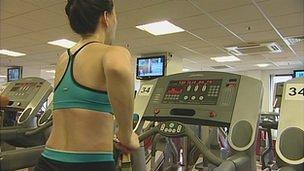North council workers taking a million sick days a year
- Published
- comments

Council workers in the North East and Cumbria take more days off sick on average than private sector employees
The Politics Show has discovered that council workers in Cumbria and the North East took a million days off work with sickness in the previous financial year.
The information was gathered via Freedom of Information requests to each council.
On average each council worker took nine days worth of sick leave during 2010/11 adding up to a total of 976,874 days off work.
According to the CBI, external, the equivalent sickness rate in the private sector was 6.5 days per employee.
Sickness rates
Top of the list in our survey was Gateshead Council, external with workers taking an average of 10.2 days off in 2010/11.
Here's the full table of those who provided comparable data for 2010/11:
Gateshead 10.2 days
South Tyneside 9.9
Durham County Council 9.7
Sunderland 9.5
Carlisle 9.2
Hartlepool 9.1
Ryedale 8.8
Hambleton and Newcastle 8.5
Middlesbrough, Northumberland, Stockton 8.4
Allerdale 8.3
Richmondshire 8.1
Redcar and Cleveland 8
North Tyneside 7.9
Darlington and York 7.7
North Yorkshire 7.1
Cumbria County Council, and Scarborough, Eden and Copeland councils did provide some data but not in a form where it could be compared with the other local authorities listed.
The sick days are calculated on a Full Time Equivalent basis. They include all council employees from chief executives, to cleaners, from fitness trainers to teachers.
As you can see even the best performing councils still had more absences on average than most private sector companies. The question is why?
Private sector
That is harder to say. Some in the private sector see it as something that just wouldn't be tolerated in their world.

Workers at Stockton's Darchem Engineering have low sickness rates
Employees at the Stockton company Darchem Engineering , externaltake an average of just four days off sick each year.
Managing director Graham Payne cannot imagine coping with a sickness rate of 10 days per worker.
He said: "At this company, that rate would be completely unsustainable. It would have a destructive impact on our customer service and supply situation, and have a further impact on our costs."
But councils deny that their employees are guilty of malingering, or taking duvet days.
Instead, many point to the sheer variety of work and the potentially high stress levels in some of the jobs.
Mike Barker is Gateshead Council's strategic director of legal and corporate services.
He believes his local authority might top the absence table because of the accuracy of its sickness reporting.
He also says Gateshead has retained manual workers that might have been hived off to private sector contractors by other councils.
Duvet days
But in any case he believes local authorities have higher sickness rates because of the sheer variety of people they employ.
He said: "I think there are a lot of myths that absence rates in the public sector are down to malingerers.
"I do not think there are any examples of employees on long term sick leave who would not rather be fit enough to work.
"At this council we still employee a lot of manual workers, in construction and grounds maintenance, and care workers too. Some do physically strenuous work, other staff jobs involve some form of emotional stress as well."
But some councils have managed to reduce their sickness rates by targeted help.
Newcastle Council, external offers a subsidised gym membership and free physiotherapy sessions.
That has helped reduce its sickness rate by a third over the last seven years, saving the council an estimated £7m.
Deborah Wrightson is one beneficiary.
The customer service worker had to take time off because of back problems. But the physiotherapy has got her back to work.
She said: "I was bed-ridden for three or four months with my back going into spasm. It was very painful and meant I was off work for a long period of time.
"The occupational therapist referred me for physical therapy and the sessions with the physio have worked wonders. They helped give me an insight into the signs to look for and avoid back problems."

Newcastle Council's decision to provide subsidised gym membership to its staff has helped cut sickness rates
Of course, you might expect the current cuts affecting councils to be reflected in the sickness rates.
That's hard to judge from our survey as we have no comparison over time, but if anything there is an indication that absence rates might be falling.
But clearly there is still more work to do, and there are still many millions of pounds of public money spent each year on covering for sick council employees.